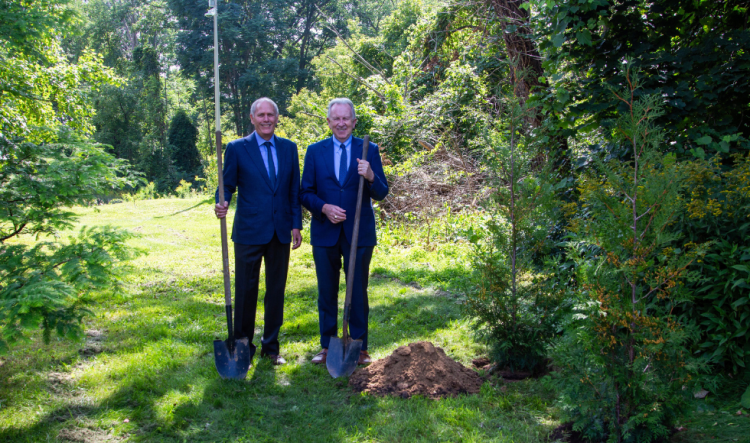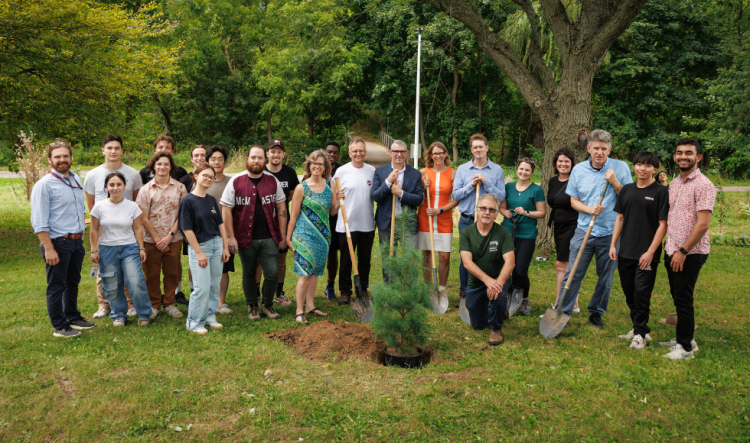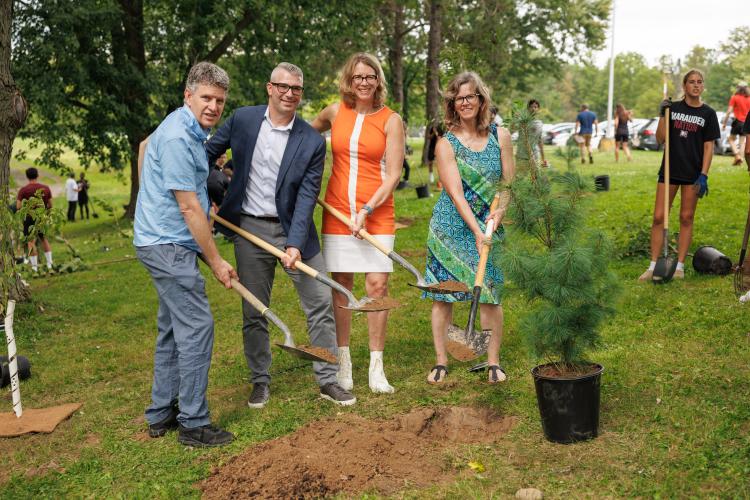While some light candles and others inflate balloons, McMaster has unique plans to celebrate a milestone birthday for a generous donor.
In recognition of the 99th birthday of philanthropist and entrepreneur Stephen Jarislowsky on Sept. 9, the university has planted 99 native trees on west campus.
The trees are a living legacy that honour Jarislowsky's ongoing support and will enrich McMaster's campus for generations.
"On behalf of McMaster University, I thank Mr. Jarislowsky for his tremendous generosity and wish him a happy 99th birthday," said President David Farrar.
"By planting 99 trees, we are celebrating Mr. Jarislowsky's long-standing support for our researchers and students and its impact on our communities, whose health and well-being are enhanced by this world-class research."

President David Farrar and Dean of Health Sciences Paul O'Byrne joined the tree planting in west campus.
The west campus area, between Dundas Valley and Cootes Paradise, has been designated an environmentally significant area by the City of Hamilton. With more than 750 native plant species, 277 types of migratory birds, 37 mammal species, 14 reptile species, nine amphibian species and 68 species of Lake Ontario fish, the area is a crucial part of local ecosystems.
The tree planting underscores McMaster's commitment to conserving and stewarding significant natural habitats. Protecting and strengthening these natural lands not only aligns with the university's Net Zero Carbon Roadmap, Sustainability Strategy and Campus Plan, it also furthers McMaster's capacity for research and projects that address the impacts of human disruptions to Earth.

Students, faculty and staff surround one of the 99 native trees planted in west campus in celebration of philanthropist Stephen Jarislowsky's 99th birthday.
Similarly, Jarislowsky's long history of philanthropic giving to McMaster has also focused on making people and the planet healthier by establishing two endowed research chairs.
In 1996, the Jarislowsky Foundation established the Stephen A. Jarislowsky Chair in Environment and Health. Biology professor Karen Kidd, who currently holds the chair, leads a research team that explores how human activities affect the structure and function of freshwater and marine ecosystems.
"We are seeing mixtures of drugs and pharmaceuticals in rivers and lakes on every continent, especially in countries with poor or no wastewater treatment," said Kidd, whose lab has supported 27 undergraduate students, 12 master's students, five PhD students and three postdoctoral fellows since she was named the Jarislowsky chair in 2017.
"This is a problem that requires action from researchers around the world, and I am grateful for the unwavering support Mr. Jarislowsky has provided my team and our efforts."

Left to right: Cameron Currie, the Stephen A. Jarislowsky Chair in Pandemic Prevention and Research; Gianni Parise, dean of Science (acting); Maureen MacDonald, dean of Science (on research leave); and Karen Kidd, the Stephen A. Jarislowsky Chair in Environment and Health, prepare a white pine for planting.
In 2020, just months after the start of the COVID-19 pandemic, the foundation established the Stephen A. Jarislowsky Chair in Pandemic Prevention and Research.
Biochemistry and biochemical sciences professor Cameron Currie, the inaugural chair, and his research team are exploring how microbes help their hosts evolve and fight diseases, and their potential as a source of new antibiotics and antivirals to treat human infectious diseases.
"Using animal host-associated microbes as a source of new drug leads could be game-changing in the global fight against antimicrobial resistance," said Currie, whose lab supports six students.
"On behalf of my team, I thank Mr. Jarislowsky for his visionary leadership in funding research that will be critical in McMaster's ability to identify and mitigate emerging global health risks."
The tree planting took place on August 28, when more than 60 faculty, staff and students took up shovels to populate the area. Within 90 minutes, all 99 trees were settled into their new homes, much to the credit of the McMaster men's and women's varsity soccer teams and the Nature @ Mac program, who volunteered their time to plant deeper roots in our west campus.
The volunteers were joined by Farrar, Kidd, Currie and other senior leaders and lab members. They planted 16 different species of native trees, acquired through partnerships with Trees for Hamilton and the Trans Canada Trail. The species included a mixture of tall canopy trees, such as red oaks, and smaller trees, such as paper birches.
The tree planting was complemented by a demonstration of a new electric bus shuttle from Parking Services. Volunteers travelled from Gilmour Hall to the planting site at the edge of Parking Lot P using the service that will replace the university's gas-powered fleet by spring 2025.
Students from the Kidd and Currie labs came together in celebration of Jarislowsky, whose philanthropic generosity has supported their work and research efforts.
"Whether they visit west campus to hike its trails, study its biodiversity or park their vehicles, students, faculty, staff and community members will see this beautiful collection of native trees grow for decades to come," said Farrar. "As these trees support the health of our west campus ecosystem, they will remain a testament to Mr. Jarislowsky's commitment to the health of our planet and societies."










